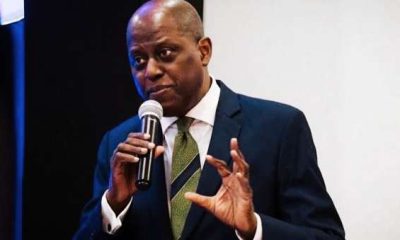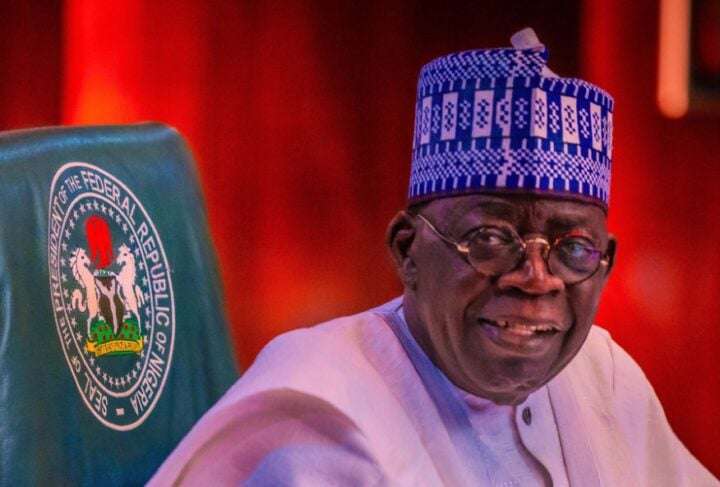Cover Story
Emefiele’s burden: The struggles of Nigeria’s most influential public servant

By OKEY ONYENWEAKU
Monetary policy all over the world has far-reaching implications for not only the financial markets but also the economies of sovereign nations. Therefore, every helmsperson at the Central Bank strains to keep their eyes on the ‘crystal ball’ at all times. There is no doubt about this as experts believe that managing a nation’s treasury is indeed one of the toughest calls that a mere mortal can be saddled with. This is because, given the centrality of the wallet in the affairs of men today, quite a lot that goes on revolves around the limits set by monetary policy managers.
Not even the iconic and longest-serving Chairman of the Federal Reserve Bank of the United States of America, Alan Greenspan, could deny his slips, confusion and loss of control of the management of money in his two decades on the saddle.
The man, who was widely seen as a legend by many, is known to have confessed to misunderstanding some of the complex money market instruments that were at his disposal to deploy and blamed his failure in such instances on what he called ‘market exuberance.’
Gordon Brown, former Prime Minister of Britain, who was also the longest-serving Chancellor of the Exchequer in the United Kingdom (from 1997 to 2007)at some point during his reign, himself also stuttered and became almost confused when the challenges of managing the treasury intensified.
He subsequently bowed his head and admitted to making a ‘big mistake’ over the regulation of banks, adding that the government ‘didn’t understand just how entangled things were.’
Back here in Nigeria, Prof. Chukwuma Soludo’s seemingly radical banking consolidation exercise, which ended in 2006, also created a paradigm shift as well as hiccups that were in turn to further engage and vigorously challenge his predecessor, Sanusi Lamido Sanusi to dig deeply into Houdini’s pouch in search of fresh cards to play.
Nevertheless, the activist intellectual, Sanusi, in his characteristic manner, stoked even more fires that were to further startle the banking industry, creating somewhat considerable tension with his quite combative risk management strategy, which he battled with until his exit.
Of course, the circumstances that surrounded Sanusi’s exit meant that the country at that point needed somebody of extraordinary mien even as industry experts agree that managing the treasury of a not quite very productive economy like the Nigerian economy had been for very many years is not a mean feat.
Emefiele, like the biblical David, was in the bush tending his sheep (Zenith Bank), and not even in the reckoning when names emerged as a possible replacement for Sanusi Lamido Sanusi when he was headhunted. Those whose names loomed large and dominated the newspaper headlines at that time as prospective helmsmen for the coveted position included, Aig Aig-Imoukhuede, a bank raider, who built Access Bank, Bismarck Rewane, a demi-god in practical analysis and projections, Dr.Sarah Alade, a respectable economist who had acted briefly as Governor of CBN and the ambitious Dr. Kingsley Moghalu, former deputy CBN governor and expert in banking supervision.
These were reputable and popular names that seemed irresistible in the industry.
However, coming to the current era, the answer to the moot question as to whether President Buhari had made the right choice in retaining Emefiele as the keeper of the public purse after the change of government appears to be in the affirmative given the stability he has achieved in a time of turbulence.
This also seems to equally provide an answer as to possibly why Emefiele was initially chosen by Jim Ovia, whom many see as the bishop of corporate banking in Nigeria as DMD and subsequent helmsman when circumstances dictated the choice of a new Chief Executive Officer for Zenith Bank.
However, out there in the public glare, Emefiele was still underestimated, and this, despite his managing one of Nigeria’s biggest and best service-oriented financial institutions, Zenith Bank. As CEO, he helped in building on the bank’s international forays, deepened its cash stock, and generally helped in establishing a solid balance sheet and an impressive scorecard.
Initial points of doubt
The first arrow that was shot at Emefiele was the fact of his being an industry person. But that argument no longer holds water as comments in the board rooms of banks have surprisingly changed. ‘’Is Emefiele now working against his own industry’’, many industry players seem to ask. Whereas there is no truth in that assertion, rumour mongers are wont to believe that something sinister may be at play.
Not one to be deterred, upon taking the challenging job in 2014 at the time when the economy had become very weak, the financial system in dire straits; and economic indicators drifting vigorously to the south; Emefiele and his team went to work. Though he may have been nervous at the beginning, his initial priorities were to maintain price stability, tackle inflation and ensure that the exchange rate does not suffer a lot of buffeting.
Emefiele, self-effacing and unassuming, hit the ground running, despite the aforementioned humongous challenges that seemed to create doubts that the country was ever going to survive the external shocks that almost choked to death many a commodity-exporting nation.
The shocks saw the price of crude, the mainstay of the Nigerian economy, crash from a giddy height of over $100bpd to the paltry $28 in 2016.This dealt a devastating blow to the economy, which slipped into recession for 12 months and destabilized all the economic structures built over the years.
Faced with this gargantuan problem, Emefiele must have told himself, this evil must end. It is akin to that line in Charles Williams Kennedy’s poem, Deor’s Lament, whose refrain had maintained, ‘That evil ended. So also may this.’
Not an economist and not even as popular, but armed with a banking experience that spans over two decades in a big bank, he was savvy enough to know when to open and shut the money pump that helps to lubricate financial market.
But not after he had warned currency speculators to stay clear if they did not want to burn their fingers. The racing exchange rate was brought to a screeching halt with Emefiele’s creative multiple forex management strategy, while ignoring the one-cap-fits-all floating currency system of the Bretton Woods prescription that may not be the best for Nigeria, especially at this time.
The CBN had created an inter-bank/wholesale, Invisible, Small &Medium Enterprise (SME) and the Investors/Exporters’ window. The CBN also allowed the Bureau De Change and parallel market segments to exist in the new forex regime. Today, even the International Monetary Fund agrees that the system has been stable, in addition to increasing the foreign reserves to $47bn in April 2018 before a recent slight decrease.
There is nothing that thrills investors as much as an enabling environment where they can mingle with ease especially foreigners whose interest is mainly removing the effects of the exchange rate movement. In this case, the opening of the Investors’ & Exporters’ Forex Window helped to draw foreign investors who took full advantage of it.
Records of inflows improved significantly within that period and have continued to date.
Making up for the dumbness of the fiscal authorities,
Emefiele understood early enough that his herculean task goes beyond tackling price stability, inflation and maintaining stable foreign exchange; he embarked on the developmental economy.
Emefiele’s team has pointedly been the anchor around which the present government can boast of making any economic impact.
“Fiscal business has nothing to do with monetary policy. The fiscal authorities are the ones to stimulate growth. Lower taxes, incentives, behaving properly (not harassing investors), creating an atmosphere of certainty rather than uncertainty, those are the things that bring about investment and investment multiplier.
“We are not getting enough investment, both domestic and international. Trying to substitute fiscal solutions with monetary interventions, those are bound heads, palliatives; they go nowhere’’, MD/CEO of Financial Derivatives Company ltd, Bismarck Rewane has said.
However, the CBN’s passion for the growing economy has resulted in her massive support for agricultural development and Agric- related businesses in the country. Aside from encouraging diversification of the economy to stimulate growth in the agriculture sector, the CBN evolved an innovative Agric credit plan in line with the plans of President Mohammadu Buhari. The anchor borrowers’ programme has elicited many testimonies of growing domestic products leading to food sufficiency.
The Anchor Borrowers Programme has transformed and increased Agric sector production in the country. The yield of rice from the farmers has increased from 1.5 metric tonnes per hectare to about eight metric tonnes per hectare, reducing their costs and making it possible to make their money in rice cultivation. Local producers of many products have also benefitted hugely from the closure of the border in addition to enriching many local farmers. Emefiele, in support of value addition, also saw to the restriction of forex to dealers in 43 items. ‘’As in October 2018, a total number of 862,069 farmers cultivating about 835,239 hectares, across 16 different commodities, had so far benefited from the programme, which had generated 2,502,675 jobs across the country’’, said Emefiele.
Emefiele is equally an inflation fighter, which makes him tend to keep interest rates high before now as he also wants to attract FDI into the country. Despite the high-interest rates, Emefiele creatively opened several other windows to make loans cheaply available in certain strategic sectors of the economy.
As unconventional as some of his policies may be, Dr. Alex Otti, an astute banker and former Managing Director of Diamond Bank, observed that Emefiele domesticated them to achieve low interest rates in favour of the real sector.
‘’The CBN Governor is not only a banker but an academic. He has brought, even if some people would argue, unconventionally, interest rates down and ensured lending to the real sector by increasing loan to deposit ratio to 65%. He insists he won’t devalue the currency. While many won’t agree with him, we recognize his point about ours being an import dependent economy and that people would suffer if the currency is devalued. Godwin is a good man’’. Dr. Otti pointed out.
The verdict of many industry experts is that the banking industry, though challenged, has not fared badly.
His focus and determination to succeed earned him a second term, a rare occurrence in Nigeria, save for the Military era.
“Given the expiration of the first tenure of the current Governor of the Central Bank of Nigeria on June 2, 2019, and under the provisions of Section 8 (1) and (2) of the Central Bank of Nigeria Act 2007, I at this moment present for confirmation by the Senate Mr. Godwin I. Emefiele for re-appointment as governor of the Central Bank of Nigeria for a final term of five (5) years,’ read his re-appointment letter dated May 8, 2019, in part.
Emefiele has received many awards home and abroad, including the prestigious “Best of Africa Achievement Award” given to him by Forbes in Washington DC, United States of America.
Indeed, experts believe that he has done well.
‘’If truth be told nobody expected this level of performance from him following his appointment. It was thought that he would fulfill his routine functions as the governor, playing safe and avoiding controversies. But he surprised everyone with the sort of zeal and passion he brought to the job,’’ argued Dr. Boniface Chizea, MD/CEO,BIC Consultancy services.
“Your Central Bank today is more committed to creating wealth and putting in place strong policies for creating jobs for our growing youth population; your Central Bank today is ever more committed to promoting a more stable and resilient financial system,” Emefiele had said.
His team has been applauded in all fronts for subduing the mounted stack of non-performing loans, which stood at 13 percent in 2013 before he sat on the saddle. Today, NPL has been tamed to an average of about 9 percent, a 3 year low as of September 2019.
On the flip side, though, Chairman, Zenith Bank international, Jim Ovia, has described Emefiele as the best Governor of the Central Bank, both domestic and international experts continue to be uncomfortable with the persisting multiple forex system and yet expect a unification process going forward.
As Emefiele settles into the grind of his second five- year agenda, it is instructive to call to mind the warning of the outgoing Bank of England Governor Mark Carney that central banks globally are getting close to running out of tools should they need to tackle another serious economic downturn.
But the former Managing Director of the largest banks in Nigeria, Ecobank Nigeria Plc, Mr. Jibril Aku sees Emefiele as a smart and unorthodox banker who deployed prudential monetary policy strategies to solve economic challenges in Nigeria.
‘’Godwin is an unorthodox banker. He craftily employed prudential tools to control inflation while using smart money under Development Finance to revive critical sectors of the economy’’, said Aku
In the view of Dr. Nuruddeen Abba Abdullahi’, Registrar/CEO of ANAN, Emefiele has diligently pushed policies that meets the dynamics of evolving business environment.
‘’Godwin Emefiele is a gentleman, sober and an adept in banking affairs with strong sense of responsibility. Particularly, he shows a lot of enthusiasm for meeting the dynamics of evolving business environment. He has an instinct of success being a loyal and humble administrator. Indeed, Emefiele is a role model for loyalty and fortitude’’, added Dr. Nuruddeen Abba Abdullahi / Registrar/CEO,ANAN.
Emefiele who in 2010 stepped into the larger-than-life shoes of Mr. Jim Ovia, an enigma in the banking industry as Managing Director CEO of Zenith Bank was barely given a chance. But the strong figures in Zenith Bank was the scorecard that gave credence to his quality and competence.
Today Emefiele has left nobody in doubt that he had indeed received grooming from one of the best mentors in the Nigerian banking landscape, Mr. Jim Ovia.
Despite the applause received by Emefiele however, some analysts have warned that he may be taking too much in his plate which may cause unintended consequences.
Dr. Austin Nweze of Lagos Business school (LBS), cautioned the Emefiele CBN “to do more strategic thinking and stop throwing money at every problem, adding that the apex bank should always think through policies before bringing them out to avoid being viewed as doing a trial and error operation.”
These are words of caution that should propel even deeper thinking, reflection and action from one who has come to rank in recent times as perhaps Nigeria’s most influential public servant.










